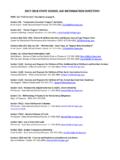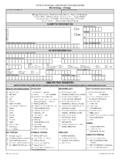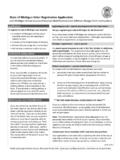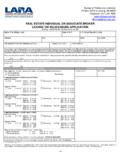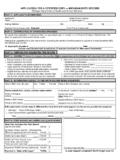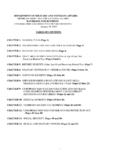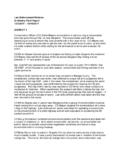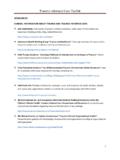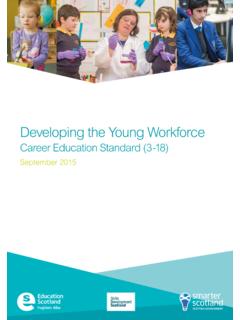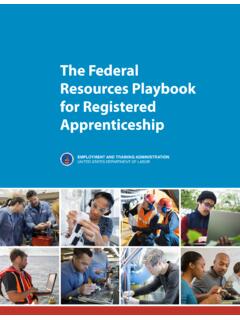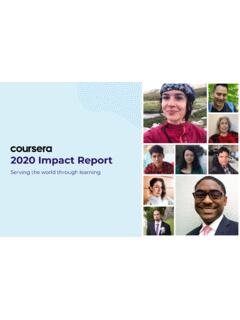Transcription of MICHIGAN
1 November 2014 MICHIGAN CORE KNOWLEDGE AND CORE COMPETENCIES FOR THE EARLY CARE AND education workforce 1 CORE KNOWLEDGE AND CORE COMPETENCIES FOR THE EARLY CARE AND education workforce TABLE OF CONTENTS TABLE OF CONTENTS INTRODUCTION ..2 COMPETENCY AREAS .. 4 ALIGNMENT .. 5 ACKNOWLEDGEMENTS .. 6 CORE COMPETENCY AREAS CHILD DEVELOPMENT .. 7 INTERACTIONS AND GUIDANCE .. 21 TEACHING AND LEARNING .. 30 OBSERVATION, DOCUMENTATION, AND ASSESSMENT .. 58 HEALTH, SAFETY AND NUTRITION .. 67 FAMILY AND COMMUNITY ENGAGEMENT .. 76 PROFESSIONALISM .. 85 MANAGEMENT .. 94 GLOSSARY .. 103 2 CORE KNOWLEDGE AND CORE COMPETENCIES FOR THE EARLY CARE AND education workforce INTRODUCTIONWith the creation of the Office of Great Start and the implementation of Great Start to Quality, MICHIGAN s quality rating and improvement system for early learning and development settings, MICHIGAN is making important improvements throughout the state to positively impact all children s academic and social development.
2 In 2013, MICHIGAN s Early Childhood Investment Corporation (ECIC) and the Great Start Early Learning Advisory Council (GS-ELAC) began the process of revising the 2003 MICHIGAN Early Childhood Professional Core Knowledge and Core Competencies (CKCC). The revised MICHIGAN Core Knowledge and Core Competencies for the Early Care and education workforce (CKCC) is a critical component in MICHIGAN s commitment to early childhood educators, an enhanced system of professional development, and improved program standards so that all of MICHIGAN s children can receive a Great Start. The CKCC framework and its progression of credentials are aligned to competencies for shared expectations of the knowledge, skills, and dispositions necessary for all early childhood educators.
3 Accordingly, the revised MICHIGAN CKCC ensures a continuum of professional growth opportunities that prepare an effective and well qualified workforce of early childhood educators. Further, the revised MICHIGAN CKCC is inclusive of appropriate levels of professional development, education , and credentials. The framework also aligns and builds upon the existing MICHIGAN CKCC, the Early Childhood Standards of Quality documents, as well as the Head Start Performance Standards, National Association for the education of Young Children (NAEYC) Accreditation Standards, and Great Start to Quality. Since 2003, much has changed in the field with regard to what early childhood educators need to know and be able to do in early learning and development settings.
4 In the last ten years, new waves of scientific research on young children and families from research on brain development and the connection of quality care with child well-being to more inclusive, collaborative approaches to educating all young children have changed the field. The broadened definition of the early education workforce exemplified in the Race to the Top Early Learning Challenge program has not only changed our understanding of what early childhood educators of young children need to know and do, but also has taught us that we must elevate the stature of the field in order to improve education in this country. A revised set of Core Knowledge and Core Competencies that defines the knowledge expectations for early childhood educators is crucial to a professional development system in MICHIGAN .
5 The CKCC design and content changes provide more specificity and clarity for what professionals should know and be able to do in their role and in the type of program within which they work. To ensure that the revised CKCC and the professional development system are relevant, appropriate, and adopted, they must be flexible, multi-layered and accessible to the full range of MICHIGAN s early childhood educators. The MICHIGAN CKCC is presented in a usable and compelling format. It includes expectations across a continuum of professional development, education , and experience, ranging from those entering the field to those with years of experience and expertise. The competencies offer a road map for developing and motivating oneself as a professional in this incredibly important and increasingly professionalized field.
6 Note: While this document s title refers to the MICHIGAN Core Knowledge and Core Competencies for the Early Care and education workforce , we simply use the term competency throughout the document to denote core knowledge and core competencies. THE CKCC PACKAGE INCLUDES: / The revised CKCC document for early childhood educators to expand knowledge and competencies in their jobs. / The companion document in development, MICHIGAN Core Knowledge and Core Competencies for the Early Care and education workforce Reflection and Professional Development Tool, allows early childhood educators to conduct self assessments and to develop individualized professional development plans. Crosswalks that align the revised CKCC with other state and national standards.
7 / WHO SHOULD USE THE CORE KNOWLED GE AND CORE COMPETENCIES? The CKCC is for professionals who work directly with young children (teachers, assistant teachers, aides, paraprofessionals, itinerant teachers, volunteers, and family, group and subsidized home providers); directors, program administrators, and early childhood specialists, and those involved with professional development organizations; teacher education programs (college professors, field supervisors); those involved with policy and advocacy initiatives (local and state agencies, policymakers, early childhood advocates); those involved with Professional Development (PD) systems; and others. / Early childhood educators can use the tool for self-assessment and intentional professional development planning.
8 / Program Administrators and Directors can use CKCC in interviewing potential staff, assessing staff performance, mentoring, identifying areas of professional development, and for creating/reviewing job descriptions. / Trainers and professional development organizations can use the CKCC to evaluate and design professional development opportunities aligned with targeted competency areas. / Teacher education programs and Institutions of Higher education (IHE) can use the CKCC to design course content to fulfill competency needs. They can also use the CKCC to advise and communicate to students about the field, and provide a common language to connect with cooperating teachers, directors and colleges. The CKCC is aligned to national preparation standards to support IHE in facilitating transfer agreements among certificate and degree granting programs.
9 / Mentors, specialists, and coaches can use the CKCC to guide, mentor, and reflect upon practice. / Local and state agencies can draw from the CKCC to develop policies, initiatives, and make funding decisions that improve the compensation of early childhood educators. / Public and private investors in education can turn to the CKCC to develop incentives and initiatives that facilitate professional competency. A NOTE ABOUT INCLUSION The following definitions have been developed to reflect our collective commitment to quality and inclusion: / All phrase all children is used throughout to include children of all abilities, representing varied ethnicities, cultures, faith, and socioeconomic status, and recognizes that all children are unique with varied interests and develop along a continuum based on their own unique development and growth patterns, temperament, and biological and environmental influences.
10 / All phrase all families denotes people who are connected to a child biologically, legally, residentially, across generations, or who are significant contributors to the child s daily life, all of whom share a concern and investment in the child s well-being. It is used to represent varied cultures, norms, socioeconomic status, and languages. / word diversity denotes variance in abilities, race, national origin or ancestry, language, age, gender, faith, socioeconomic status, sexual orientation, beliefs, cultures, habits, practices, and values. CORE KNOWLEDGE AND CORE COMPETENCIES FOR THE EARLY CARE AND education workforce 3 4 CORE KNOWLEDGE AND CORE COMPETENCIES FOR THE EARLY CARE AND education workforce COMPETENCYAREAS1) Child Development; 2) Interactions and Guidance; 3) Teaching and Learning; 4) Observation, Documentation,and Assessment; 5) Health, Safety, and Nutrition; 6) Family and Community Engagement; 7) Professionalism; and 8) Management.
